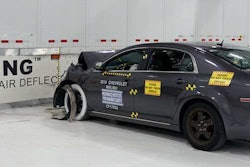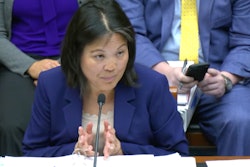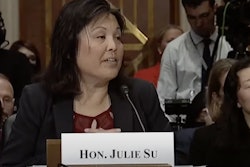Two hot button issues in the freight broker world right now are broker transparency and fraud.
That’s what Transportation Intermediaries Association (TIA) President and CEO Anne Reinke told a group last week during a regulatory update at its regional meeting held at McLeod Software in Birmingham, Alabama. The Owner-Operator Independent Drivers Association (OOIDA) has been seeking a rulemaking to require broker-shipper pricing documents be shared with truckers via an electronic copy of each transaction record within 48 hours.
Reinke said the Federal Motor Carrier Safety Administration (FMCSA) previously said it would announce a proposal in the summer, but as we march toward fall FMCSA has yet to take action. There was a push for rate transparency back in 2005 as well, but nothing ever came to fruition.
“It could still happen. We’re going to do as much heat, light and thunder toward that when that rule comes out,” she said. “… There's a lot of time for us still to make our case, and we continue to make our case.”
OOIDA CEO Todd Spencer previously wrote in a letter to FMCSA Administrator Robin Hutcheson that transparency is needed to protect carriers from “unscrupulous brokers.” Reinke obviously is against any such rulemaking, calling it “rate intrusion.” She said publishing confidential rates is not sustainable as it would drive rates down. It is unclear if the aim is to have entire rates or just line-haul rates published.
“I don't want Coca-Cola to know what my lanes are, or what I’m paying my workers, or what my line of work looks like,” she said. “These are threats to our ability to do business.”
Another threat is fraud, Reinke told the group. And she is frustrated with the FMCSA on that matter, too.
“Unfortunately, our federal friends don't feel like they can help. They feel like they're a safety organization so they can’t help with this commercial dispute,” she said, adding that the FMCSA is getting involved with rate transparency on the stance that there is a safety nexus because if a driver feels like their rate is too low, they will drive unsafely. Reinke argues rate transparency isn’t a safety issue, and therefore the FMCSA shouldn’t be involved.
“I can't figure it out personally,” Reinke said. “We can get into the fact that they don't have a reliable safety rating system for carriers today, and they could actually work on that, which is actual safety. Surely, they should focus more on safety.”
She is calling on the FMCSA to help with the fraud issue. She said TIA and its members and the FMCSA will have a listening session soon to discuss rate transparency and fraud. TIA has launched an internal fraud task force to educate the industry. It has developed a fraud data report to illustrate how big of a problem fraud has become. It aims to calculate how much time and money 3PLs spend on preventing fraud and dealing with its effects if it occurs anyway.
“It's one thing to say, ‘My $2,500 load went missing.' The state will say it’s not going to get involved with that, but if you can show that it’s a widespread issue,” she said. “There has always been some fraud or double brokering in the marketplace. In 2012, we actually defined what a broker is. Ever since then, we’ve seen people try to violate what the broker does. What's happening now seems different. It's not just your old-fashioned double brokering; its identity theft, spoofing, it's phishing, it's outright theft, it’s holding freight hostage, all of the above.”
And no one is enforcing consequences, she said.
There are regulations in place that she said aren’t currently being abided by that could help address fraud. One example, she said, is many businesses have been given MC numbers despite listing their principal place of business as a UPS Store or a P.O. Box, which violates regulation.
“Worse, there's one house in Wyoming that has 200 MC numbers assigned to it. It must be a real big house to have 200 MC numbers,” she said.
Another concern is the proliferation of dispatch services, many of which she said are performing illegal brokerage from other countries.
“There’s really no regulation whatsoever,” Reinke said. “We have some language to address this from the perspective of there shouldn’t be foreign dispatchers working on Department of Defense freight. That should be a concern. But there are no strict rules. They feel like they don't have jurisdiction over overseas operations, and they're only providing guidance as opposed to prohibition from a dispatch service. So it's something that concerns us, and we will continue to beat the drum on that.”
There are some positives happening in the regulatory world.
Reinke said one of those is the recent GlobalTranz case that determined that the broker should not be held liable for a safety issue. Another recent case held a similar verdict. Reinke said those two cases could possibly be taken to the Supreme Court for a final ruling. The second is legislation (C-TPAT Pilot Program Act) that would create a pilot project with 10 brokers that is similar to TSA PreCheck but for freight.
“We will continue to push on the FMCSA to help us to do at least the right thing while knowing that we're going to have to do most of the stuff ourselves,” she said.
CCJ reached out to FMCSA for response Wednesday but did not hear back.











